By Kieron Gillen, Jamie McKelvie, Mike Norton, and Matt Wilson; Marvel Comics
This, my crazy fan ramblings, will be built upon a tower of *SPOILERS* for Young Avengers #10 and really the series as a whole. Return here only upon reading the comic.
One of my favourite things about Young Avengers is just how experimental it has been with layout design and storytelling choices that break the boundaries and conventions of comics. For instance this opening section here, breaks the fourth wall in this really effective, really interesting way.
This page here, beyond being awesome and creepy, systematically tells us some really neat things about Mother, the antagonist and multidimensional parasite. Specifically, the comic frames Mother as living in her own dimension that exists in a meta-space between the comic and the audience. Part of this is that Mother's native dimension is a boxless white void, a void with the basic characteristics (white emptiness) of the gutters between panels. It's as if she lives in a dimension that exists in the spaces between panels. This seperate-from-comics nature is further emphasized by the panel-prisons of the mayfly dimension youngish avengeresques and how, arranged as they are, they appear as a comics page displayed for Mother's viewing. As if she were existing in a plane separate enough from the sequential art that she is both a participant and audience of events. And then of course she fucking reaches out, grabs the third person narration caption box, and goddamn devours it. Which would imply that Mother is able to not only reach into and manipulate the comic world but also to reach OUT into our world and effect events. This is some really fun, smart comics.
But it's also comics that crystallize a really wonky, really meta reading of the comic.
And since Young Avengers kind of begs for this kind of close reading attention and Kieron Gillen's Spirit Animal might just be a Meta-Deconstructionist Criticism I feel like this nonsense may be welcomed.
(Also, facts about Angler Fish. 1: They have a glowing bioluminescent lure with which they attract their prey to their ghastly large and fangy mouths. 2: male Angler Fish exist solely to locate female Angler Fish, merge with them, then atrophy their body down to a mere reproductive organ of the female's body. THESE ARE TERRIFYING LOVECRAFTIAN MONSTERS OF THE DEEP.)
(There are also things called IMMORTAL JELLY FISH.)
(Anyway....)
I think you could make the case that Mother could be a stand in for the audience. Basically she is a interdimensional parasite that is obsessed with controlling and consuming the Young Avengers, particularly Billy, who is essentially the protagonist of the story. Mother is both very powerful and generally impotent to directly reach into the universe and make changes and requires an intermediary (Billy/Loki) to gain access to them. She can feed on the "Mayfly Universes", themselves a horde of tumblr/cosplay/fanart/mashup memes, but is only truly satisfied by the true Young Avengers.
If Mother could be read as a comics audience than I think you could interpret Loki as a stand in for the comics creators. As is revealed in this issue, Loki has been quietly manipulating the Young Avengers for his own ends, both planting the suggestion to Billy that allowed Mother (the audience) to access the Young Avengers in the first place and bargaining with Mother to begin his plan to control the Young Avengers. Moreover, like an author, Loki is at once a member of the team, striving for the Young Avengers to succeed, but also a foe in that he is manufacturing conflict/problems for the Young Avengers for his own ends and for Mother (the audience). And ultimately, Loki is striving to control the Young Avengers for his own ends, be they power, creative, or freedom related.
One could also, I think, argue that Leah could be a negative critic of the writer. She has a clear grudge against Loki (the author) and is working with Mother (the audience) to turn Teddy (one of the Young Avengers) against him and the other Young Avengers. She also has at her disposal a group of jilted ex-romantic partners to various Young Avengers, which is like an army of former fans that are angry that the status quo has changed.
Now, if you accept all of this meta-interpretation, then the Young Avengers might be making a comment on the relationship between comics' characters, creators, critics, and audiences. A comment where comics readers are at once controlling parents and powerful alien parasites and creators are trickster gods driving characters to unpleasant ends at the behest of audiences. And critics are maybe cynical gods themselves, driven to destroy creators and comics for past slights and their own bitter amusements. Basically, Young Avengers posits a situation where audiences, creators, and critics struggle against each other for control of a comic. Which, if any of this is true, is one clever and dark little commentary built into the Young Avengers amongst all the punching and melodrama.
I really like this comic.
Previously:
Favouring The Young Avengers #8
Favouring The Young Avengers #7
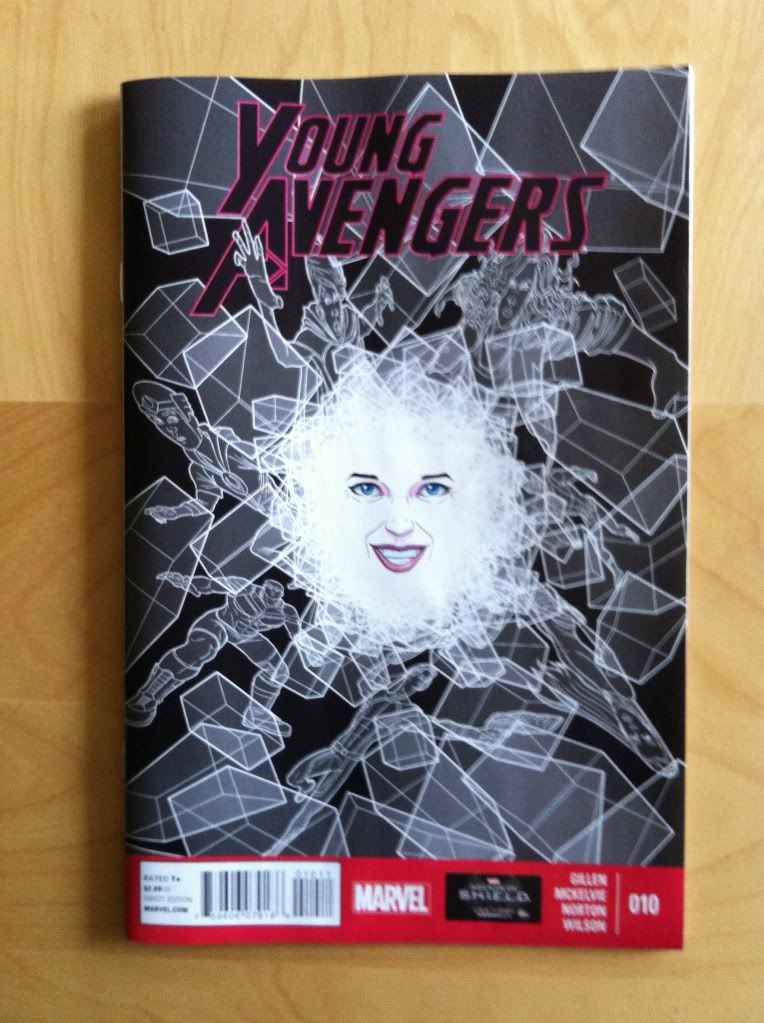
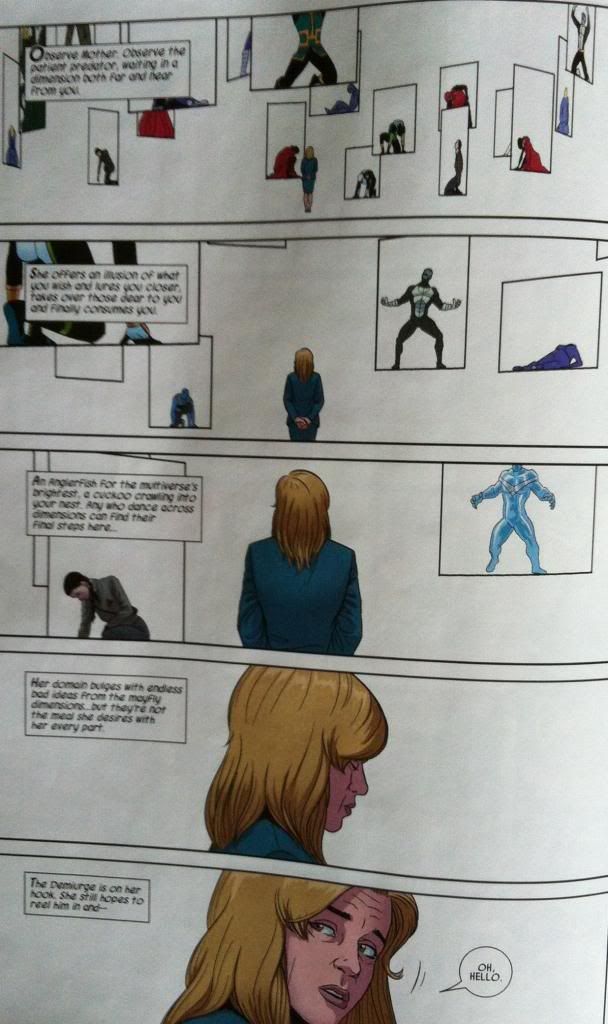
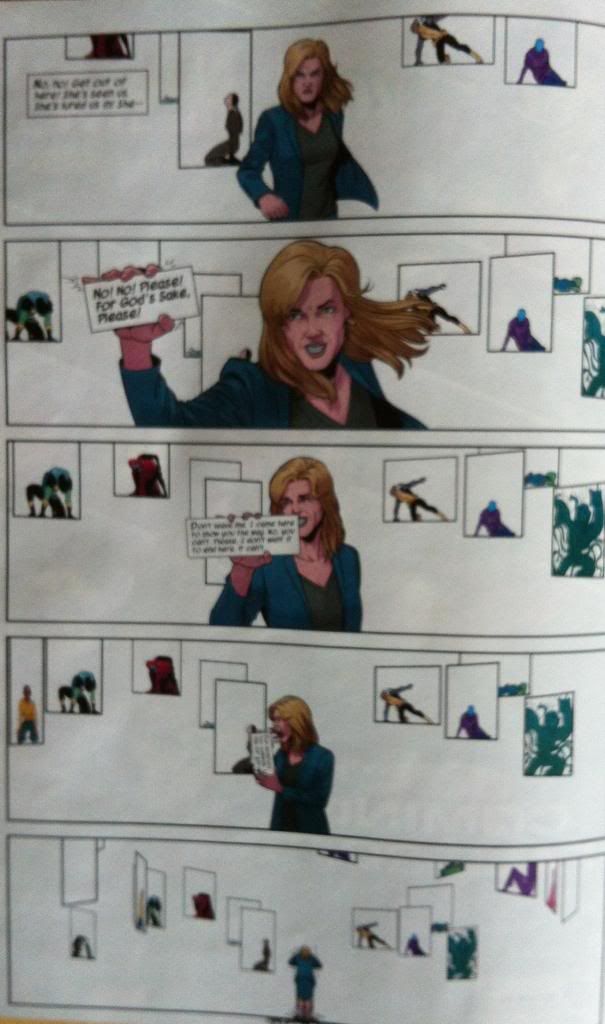
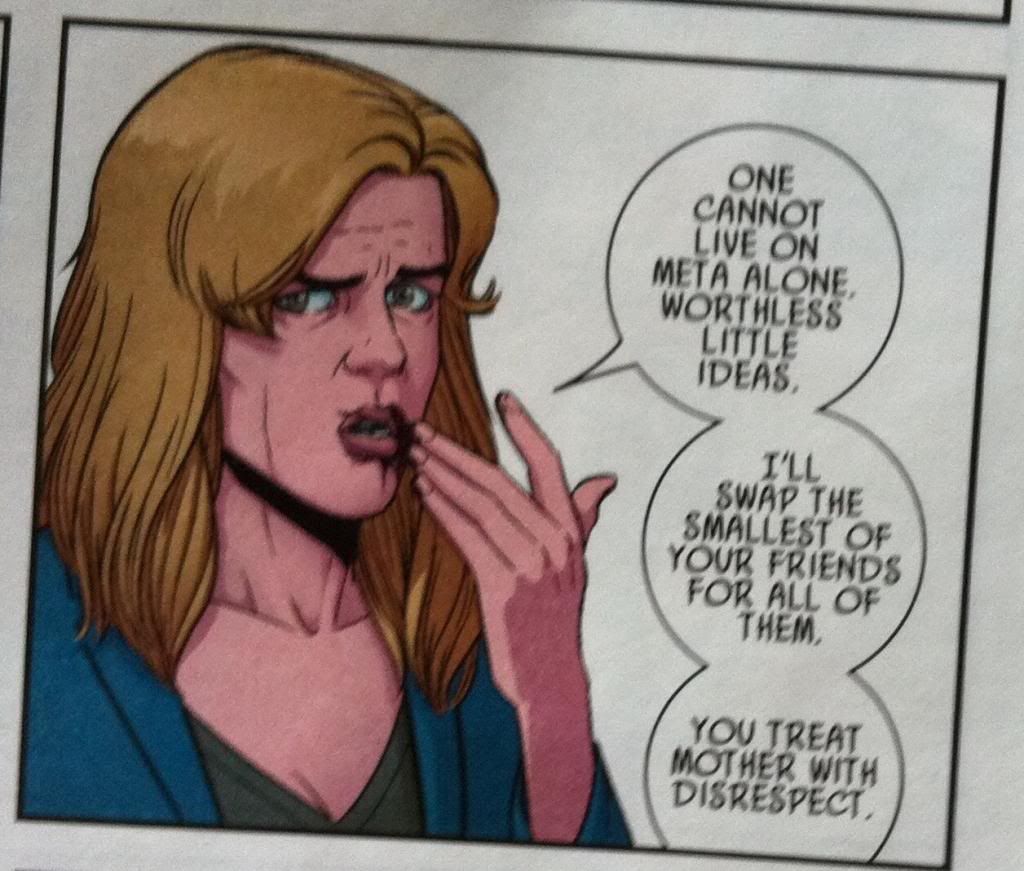
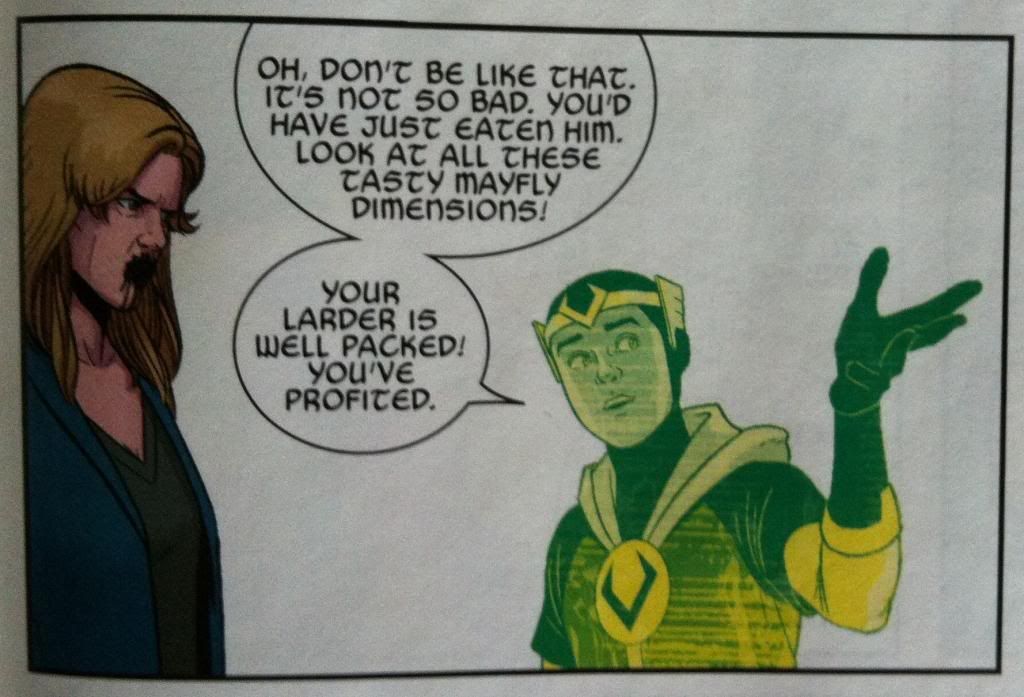

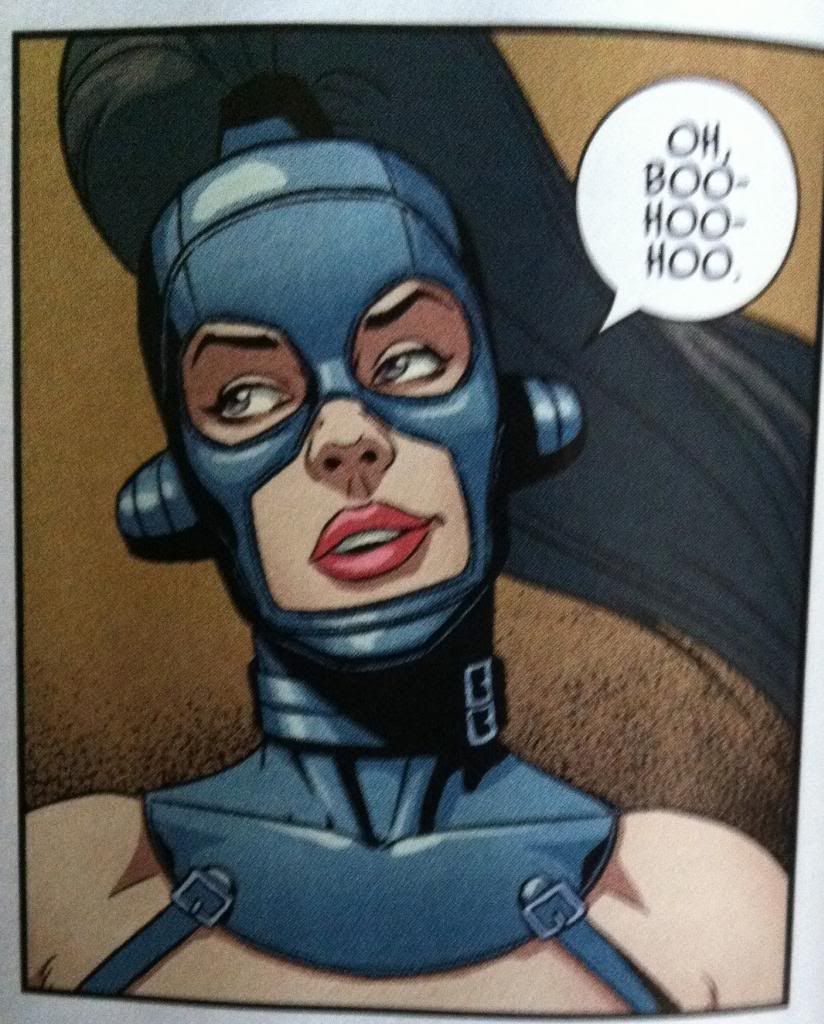
I love the way Gillen & McKelvie break the boundaries and conventions of comics, like you said. I really enjoyed reading your meta-interpretation.
ReplyDeleteThanks! I'm really digging how experimental Young Avengers is too, it makes it a really enjoyable comic to try to criticize (in the study sense, not the complain about way). Incidentally, it also makes Young Avengers a much easier comic to find interesting things to say about it.
DeleteMan, this is a pretty cool analysis and you've come up with an intriguing way to look at a comic I hadn't even considered (which is fairly stupid of me, considering how meta most of Gillen's books are).
ReplyDeleteTo pose a question: would you consider the adults of the Marvel U who have fallen under the Mother's spell, uninformed friends of the audience who are consistently surprised that they still make comics?
Thanks! Yeah, that Gillen is a tricky one, but is certainly a fun author to try and critique. (Not to mention that he writes some terribly fun comics even without all of the meta elements.)
DeleteThat's an interesting idea... and I started to write this whole thing about how I had no idea and then it hit me! What if they are represent the publisher? The adults just want the Young Avengers to go along with what Mother wants in this tut-tut don't rock the boat way. As such they are complicit in making the comic characters (Young Avengers) do what the audience (Mother) wants because they ultimately don't see the harm in that. They see the audience (Mother) as a positive influence instead of a destructive, consumptive one. And therefore the author (Loki) is put in a position of defying the publishers, his supposed allies, (the adults) to get what he wants. Maybe? Does that sound plausible?
(Oh man! Thanks for commenting! I might have to revisit my critical theory and add this to it and expand a bit on the anti-Young Avengers. I will totally give you a shout out if I do.)
Kieron Gillen is my rockstar. He's made me buy Ironman and I'm not the biggest Ironman guy.
DeleteWow, yeah that works a lot better actually. I think any unintended symbolism or analogy has holes in it when examined too closely--every fan theory does because they aren't in charge of the material unless they nail what the author intended dead-on--but I think you've really got a decent thing going on here.
This "Loki-as-author" theory starts to get even more fun when its put on the same plate as what Loki was in Gillen's JIM run, specifically that final issue.
I kind of regret not giving JIM a chance. It had the unfortunate timing of running at the same time as a bunch of years long runs I was reading so my budget was already maxed out... and I worried about the parody of the Sandman exposition aspects of it. Sandman, while very good, goes waaaaaaaaaay overboard with the exposition sometimes. But yeah, I feel like I missed out.
DeleteHow is his Ironman? I was pretty happy with Fraction's very long run and wanted a break from Ironman, a sort-of-ending and haven't given it a shot. Any good jumping on points coming up? Is Greg Land still the main artist? (I'm not a huge fan of his art...)
Never read Sandman (a crime, I know. Currently on the run from the lynch mob. Typing this up from under an overturned wheelbarrow). Huge Gillen-fanboy that I am, I can't tell you that I found it overly expositional in any sense. But it definitely got wordy at times. But it was Gillen-wordy so it was always clever and fun. He uses a lot of omniscient narrator text boxes but it was generally to give it that old-school fantasy feel. When he wasn't using it, you knew something was up. It's my favorite story, period, so I'm probably not the one to come to when seeking an objective review.
DeleteHis Ironman, on the other hand, ehhhhhh so-so. It seems so much more…mundane than his other writing. As always, there are some clever ideas and the dialogue is always fun (Death's Head is great, in particular) but I honestly considered dropping it after the last arc. In fact, I did for about half a day before I reread the solicit and said, "might as well see where this is going." I'm back on board for another arc but my grip is a bit tenuous. The beginning of the new arc came out last week, I think. I feel the same way about Land--and think it's a bit criminal how Gillen keeps getting paired with him--but I think he's primarily drawing Mighty Avengers now. Joe Bennett is the current artist
Heh. I've only managed to read the first half of Sandman. It's great, but too strong a flavour to do all 12 volumes in a go. Trying to psyche myself up to do the second half, but keep getting distracted by all the amazing non-big-two comics out there. It's kind of a great problem.
DeleteIt sounds like I will have to buy the JIM omnibus and give it a read. It's always pretty magic when a-list authors really dig into something, and Gillen's best is pretty special.
Hopefully there won't be any other Gillen-Land joints, because as great as Kieron Gillen is, Land is a deal breaker for me. Bad art ruins comics. (And there are really very few fulltime comics artists I'd actually hazard to call bad.)